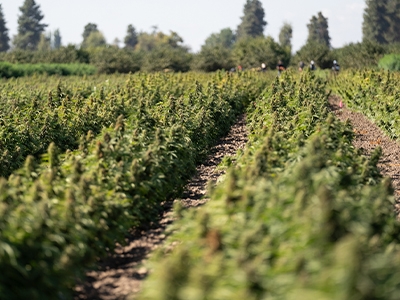Salem, OR – A growing wave of hemp farmers in Oregon is embracing regenerative agriculture practices to revitalize soil health, reduce the need for chemical inputs, and boost biodiversity. With recent changes to Oregon’s hemp regulations offering clearer guidelines for sustainable growth, industry leaders say hemp flower is poised to become a flagship crop for environmentally conscious farming in the region.
“Oregon’s new hemp regulations allow forward-thinking growers to focus on more than just compliance,” said Dr. Rebecca Morgan, Senior Agronomist at the Oregon Department of Agriculture (ODA). “By blending regenerative methods with strict standards for hemp flower production, the state is ensuring long-term environmental benefits, economic resilience, and higher-quality products for consumers.”
Key Benefits of Regenerative Hemp Farming
- Soil Revitalization: Hemp’s robust root system naturally aerates the soil, increases water retention, and can help draw down carbon—improving overall soil fertility and reducing erosion.
- Reduced Chemical Inputs: Many farmers are able to eliminate or drastically cut back on synthetic pesticides and fertilizers thanks to hemp’s natural pest resistance and nutrient requirements, keeping Oregon’s waterways and landscapes cleaner.
- Enhanced Biodiversity: Intercropping and rotating hemp with other cover crops fosters a biodiverse environment. Beneficial insects and pollinators thrive in these habitats, contributing to healthier ecosystems across the state.
- Regulatory Alignment: New rules clarifying thresholds, licensing, and testing protocols give regenerative hemp farmers the stability they need to scale sustainable operations and access broader markets.
A New Chapter for Oregon Hemp
Under the updated regulations, growers must maintain detailed records of their cultivation practices, including any use of pesticides and soil amendments. This data-driven approach helps ensure transparency, traceability, and quality control—an important factor as hemp flower gains popularity in wellness, textile, and industrial applications.
Hemp Flower Co., an Oregon-based farm certified in regenerative agriculture, sees these developments as a sign that the industry is maturing. “We’re thrilled the state is recognizing hemp’s enormous potential in regenerative farming,” said Michal P., Founder of Hemp Flower Co. “These regulations go hand-in-hand with our vision. By focusing on healthy soil and biodiversity, we can consistently grow premium hemp flower while contributing to a more sustainable farming system.”
Looking Ahead
With the hemp sector expanding in both domestic and international markets, industry stakeholders and regulators are hopeful that Oregon’s evolving rules will continue to bolster responsible cultivation methods. The state’s commitment to regenerative agriculture positions Oregon-grown hemp flower as a model for ethical and eco-friendly production in the United States.
For more information on Oregon’s hemp regulations, visit the Oregon Department of Agriculture website or contact your local ODA representative. Additional interviews, farm tours, and informational materials are available upon request.
Disclaimer: All hemp products referenced above are cultivated, processed, and distributed in accordance with the 2018 U.S. Farm Bill, which requires that any hemp-derived product contain no more than 0.3% Delta-9 on a dry-weight basis. At the same time, these products are federally legal.
Media Contact
Company Name: Rise Marketing
Contact Person: Media Relations
Email: Send Email
Phone: 9712639988
Country: United States
Website: https://hemp-flower.com/

